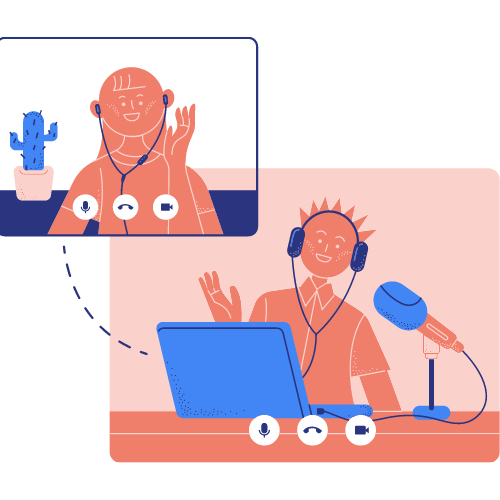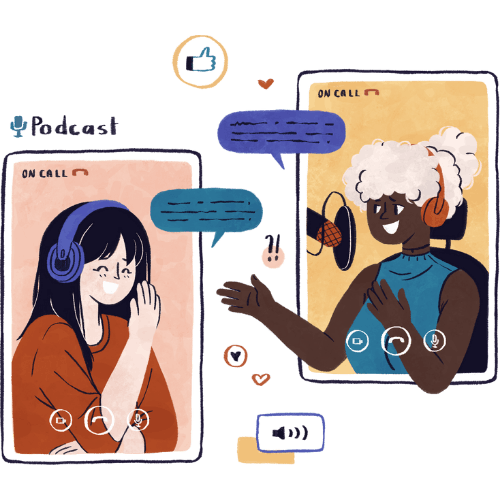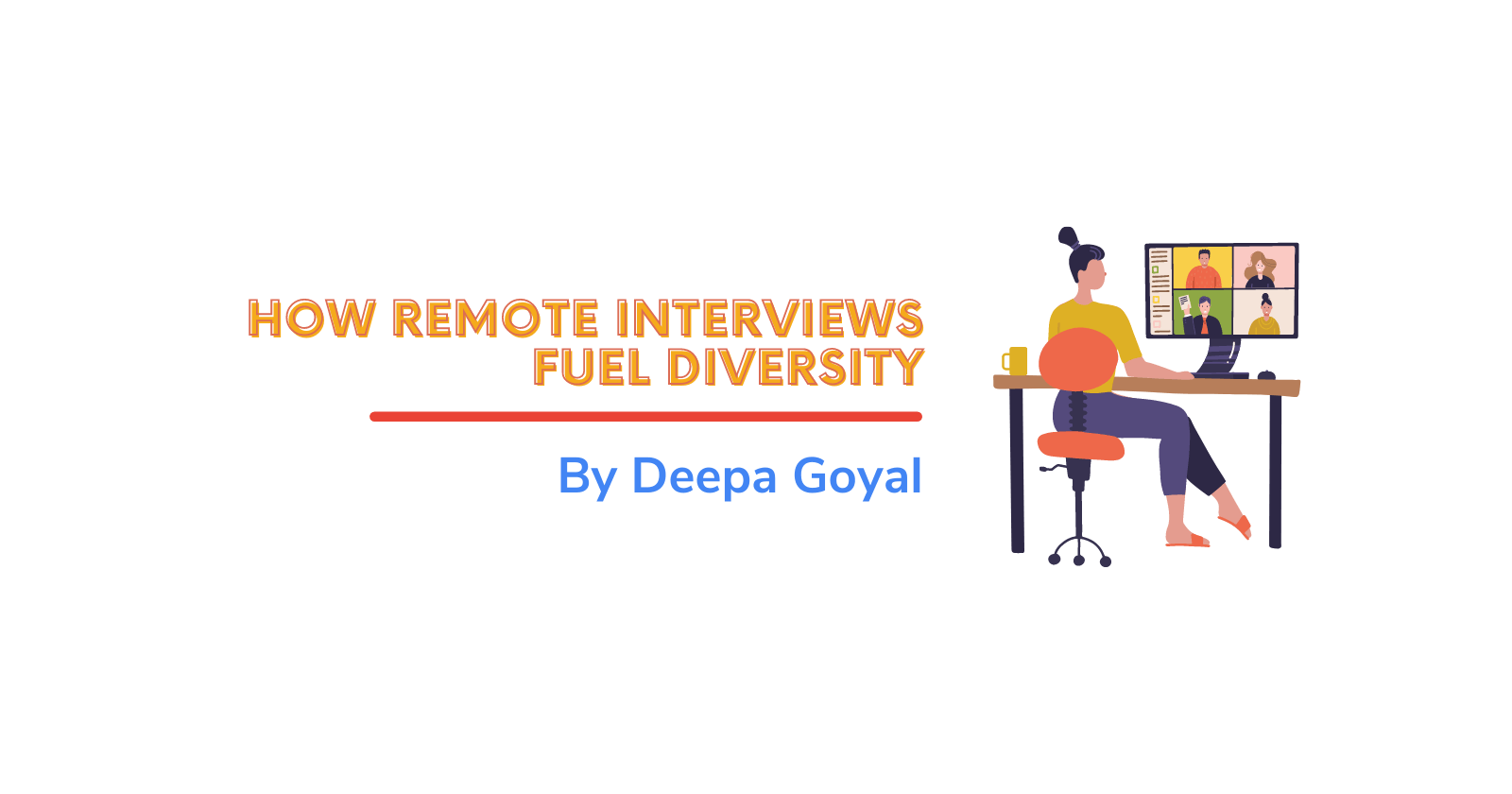How Remote Interviews fuel diversity
Pandemic has forced us to embrace working remote and however uncomfortable it may have been at first, it has had its benefits.
I searched for jobs during the pandemic and completed full interview loops over Zoom. I don't want to state how many interviews but let's just say I'm a prolific interviewee. I made meticulous notes of my interview experiences and also screen recorded some of them for me to review later. This really helped me prepare better and improve my performance.
I couldn't help but notice, that remote interviews not only had a higher conversion rate for me, but I also had much more high quality conversations in remote interviews than I had had ever before in interviews. The depth of questions and scenarios that we walked through was substantially more extensive.

Throughout my 10+ year career before the pandemic I was the person who liked to get ready and go to work. I get it from my dad who still does it at 66. I reached office early to get face time with management and made connections in the process. I had never experienced 100% remote working and the few people I had had on my team who were 100% remote had been very ineffective. So my personal experience had not been in favor of remote environment and I was definitely not prepared to start new jobs without ever having met my coworkers in person. I was afraid that the rules of the remote work environment would put me at a disadvantage.
A number of my assumptions were invalidated though my own experience job hunting and joining new roles during the pandemic. I also found some patterns that surprised me.
1. More opportunities
While some companies had layoffs, a lot of organizations experienced massive growth in the silicon valley. I had expected that women and people of color might experience having fewer opportunities, but to my surprise, I received substantially higher number of interview opportunities. These were also really high quality roles.
2. Higher Quality Conversations
As I started on the interview loops, I noticed that the quality of conversations was so much better in remote interviews than it had ever been in in-person interviews. While in a lot of in-person interview we come home and think, "Oh, I wish I had a chance to talk about that project.", In remote interview I was constantly surprised at the number of things and details we were able to touch upon.
3. More offers
Having high quality conversations through remote interviews directly led to having higher conversion rates and getting more number of offers than I have ever received before. This is a direct result of people not being distracted by their day-to-day logistics of coming to office or grabbing coffee or finding the right conference room. Interviewers were dialing in and jumping right into it. They were asking harder questions and were not distracted by things like how tall I am or how short I am or if my purse matches my dress or my shoes. The reason I mention those things is because those had been the things people would notice in interviews in-person.
In the remote setting, interviewers had nothing but a face on the screen for every candidate. People were zoom fatigued enough that nobody wanted to lose a single moment talking about things that weren't important. This resulted in them asking great questions and ultimately having high quality conversations.
4. Diverse interview panels
In my experience across tens of interviews, I noticed that employers were making a conscious effort to put together a diverse panel. Which meant that teams that still couldn't put together a diverse panel, either did not making the conscious effort or didn't have enough diversity on the team. Both of them are red flags.
This is a great input for me to make a decision because in some cases I might be the token diversity hire and if I joined, I would not have any real growth opportunities.
5. Faster turnaround times
The efficiency in remote environment has led to people submitting interview feedbacks quicker and the interview processes completing in less than a quarter of the time it used to previously take. Pre-pandemic, I used to keep 1 week as the expected response time after an interview: if a recruiter did not come back with next steps within 1 week of me completing an interview, they didn't want me. I'd assume it's a rejection, or I'm not the top candidate or the team is just not effective at making decisions.
Remote interviews were getting back to me within a day or maximum of 3 days. I was completing screening to final rounds within a 6-7 working days.
Joining remotely
The IT teams made sure to send laptops and set people up to join smoothly. That part of onboarding was seamless.
Prior to the pandemic, people used to join, form a bond with maybe 2-3 people they liked first, and spent the most amount of time with them. This meant that there were some people who were either shy or introverted, were not on the radar of the new employees to make a connection with.
In the remote world, new team members set up one on one with each team member and truly have a conversation. I felt that I got a chance to connect with a wider set of my coworkers than I would have in in-person settings. I made some incredibly valuable connections through the pandemic with people I have never met.

This is also because I didn't have to pick a lunch place with them and I didn't have to physically be in a conference room with them. This feeling of safety in my own home, combined with removal of trivial conversations allowed everyone to simply talk about the projects and challenges people cared about and our working relationships started to be based on these topics rather than things like if we both liked sushi.
Feeling of physical safety
Everything is not rainbows and sunshine. I have had some uncomfortable conversations at work both in-person and remote settings. But as a woman, I felt that I could feel physically more safe not having to be in a conference room with someone who made me uncomfortable.
I could also vocalize my concerns more comfortably in remote settings. I could turn off the screen and feel perfectly distant. Even things like people standing too close to me is something I notice and in the pandemic the only person who has been in my immediate physical proximity have been my closes friends and family. This feeling of physical safety has been precious.
Promotions for women
In the past 2 years of remote working, I saw the most number of women be promoted in their roles during the pandemic than I had every before. I saw more women and people of color be hired during the pandemic than before. I saw numerous women and people of color break into tech for the first time in their careers.
Even as an interviewer, I noticed a higher number of women candidates in the interview process than I used to before. If I were to estimate, it has been an increase from 10% women candidates to 50% from my personal interview experience. And that's a very desirable outcome.
Over the past few months I spent time asking people around me if they had the same experience, and some of the men told me that they also felt that their physical attributes being removed from scrutiny had allowed people to focus on the value they brought to the table and improved their overall professional experience.
My pre-pandemic era notion that remote-working was not as effective was completely invalidated with the overwhelmingly positive experiences during the pandemic.
I have also created some remote interview tips-and-tricks as well as practices that help me be more effective in the remote environment but that may be for another post. I can only speak for myself and this might be a common experience and it may not be. I would love to hear other people's experiences in this regard. Please do share!

